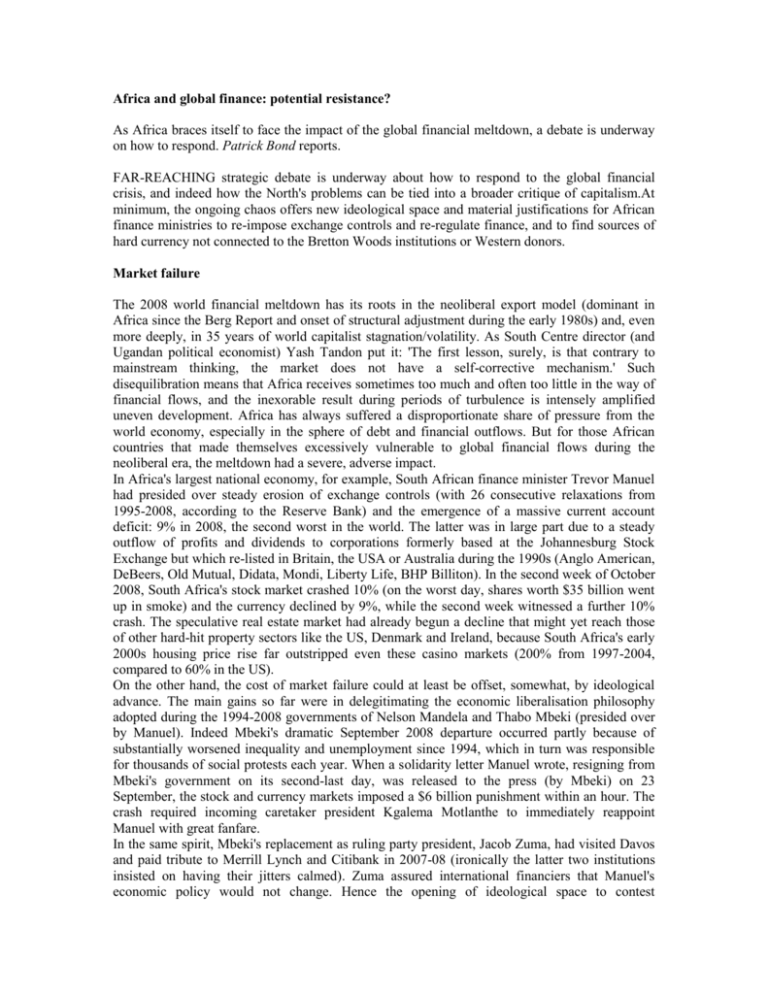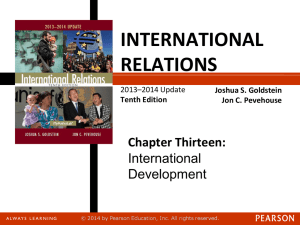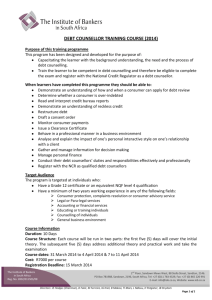Africa and global finance: potential resistance
advertisement

Africa and global finance: potential resistance?
As Africa braces itself to face the impact of the global financial meltdown, a debate is underway
on how to respond. Patrick Bond reports.
FAR-REACHING strategic debate is underway about how to respond to the global financial
crisis, and indeed how the North's problems can be tied into a broader critique of capitalism.At
minimum, the ongoing chaos offers new ideological space and material justifications for African
finance ministries to re-impose exchange controls and re-regulate finance, and to find sources of
hard currency not connected to the Bretton Woods institutions or Western donors.
Market failure
The 2008 world financial meltdown has its roots in the neoliberal export model (dominant in
Africa since the Berg Report and onset of structural adjustment during the early 1980s) and, even
more deeply, in 35 years of world capitalist stagnation/volatility. As South Centre director (and
Ugandan political economist) Yash Tandon put it: 'The first lesson, surely, is that contrary to
mainstream thinking, the market does not have a self-corrective mechanism.' Such
disequilibration means that Africa receives sometimes too much and often too little in the way of
financial flows, and the inexorable result during periods of turbulence is intensely amplified
uneven development. Africa has always suffered a disproportionate share of pressure from the
world economy, especially in the sphere of debt and financial outflows. But for those African
countries that made themselves excessively vulnerable to global financial flows during the
neoliberal era, the meltdown had a severe, adverse impact.
In Africa's largest national economy, for example, South African finance minister Trevor Manuel
had presided over steady erosion of exchange controls (with 26 consecutive relaxations from
1995-2008, according to the Reserve Bank) and the emergence of a massive current account
deficit: 9% in 2008, the second worst in the world. The latter was in large part due to a steady
outflow of profits and dividends to corporations formerly based at the Johannesburg Stock
Exchange but which re-listed in Britain, the USA or Australia during the 1990s (Anglo American,
DeBeers, Old Mutual, Didata, Mondi, Liberty Life, BHP Billiton). In the second week of October
2008, South Africa's stock market crashed 10% (on the worst day, shares worth $35 billion went
up in smoke) and the currency declined by 9%, while the second week witnessed a further 10%
crash. The speculative real estate market had already begun a decline that might yet reach those
of other hard-hit property sectors like the US, Denmark and Ireland, because South Africa's early
2000s housing price rise far outstripped even these casino markets (200% from 1997-2004,
compared to 60% in the US).
On the other hand, the cost of market failure could at least be offset, somewhat, by ideological
advance. The main gains so far were in delegitimating the economic liberalisation philosophy
adopted during the 1994-2008 governments of Nelson Mandela and Thabo Mbeki (presided over
by Manuel). Indeed Mbeki's dramatic September 2008 departure occurred partly because of
substantially worsened inequality and unemployment since 1994, which in turn was responsible
for thousands of social protests each year. When a solidarity letter Manuel wrote, resigning from
Mbeki's government on its second-last day, was released to the press (by Mbeki) on 23
September, the stock and currency markets imposed a $6 billion punishment within an hour. The
crash required incoming caretaker president Kgalema Motlanthe to immediately reappoint
Manuel with great fanfare.
In the same spirit, Mbeki's replacement as ruling party president, Jacob Zuma, had visited Davos
and paid tribute to Merrill Lynch and Citibank in 2007-08 (ironically the latter two institutions
insisted on having their jitters calmed). Zuma assured international financiers that Manuel's
economic policy would not change. Hence the opening of ideological space to contest
neoliberalism in practice became a crucial struggle for the trade unions and South African
Communist Party, which in mid-October held an Alliance Economic Summit that suggested
Manuel make only marginal shifts at the edges of neoliberalism.
However, as the financial meltdown unfolded in the US and Europe, the merits of South Africa's
residual capital controls became clearer. As SA deputy trade minister Rob Davies wrote
approvingly in the main Communist journal: 'Interestingly, the Business Times of 21 September
attributed this [safety from contagion] partly to "exchange control"' which meant 'there is a
healthy degree of trapped liquidity within the financial system.' Another factor was that many
exotic financial products had been banned. As a leading official of the central bank, Brian Kahn,
explained:
'The interbank market is functioning normally and the Reserve Bank has not had to make any
special liquidity provision. We have a relatively sophisticated and well-developed banking sector,
and the question then is, what has saved us? (This may be tempting fate, so perhaps I should say
what has saved us so far?) This all raises the old question whether or not exchange controls work.
The conventional wisdom is that they do not, particularly when you need them to work. We seem
to have been exception to this rule. It turns out that we were protected to some extent by prudent
regulation by the Bank regulators, but more importantly, and perhaps ironically, from controls on
capital movements of banks. Despite strong pressure to liberalise exchange controls completely,
the Treasury has adopted a policy of gradual relaxation over the years. Controls on non-residents
were lifted completely in 1996, but controls on residents, including banks and other institutions,
were lifted gradually, mainly through raising limits over time. With respect to banks, there are
restrictions in terms of the exchange control act, on the types of assets or asset classes they may
get involved in (cross-border). These include leveraged products and certain hedging and
derivative instruments. For example banks cannot hedge transactions that are not SA- linked.
Effectively it meant that our banks could not get involved in the toxic assets floating that others
were scrambling into. They would have needed exchange control approval which would not have
been granted, as they did not satisfy certain criteria. The regulators were often criticised for being
behind the times, while others have argued that they don't understand the products, but it seems
there may be advantages to that! Our banks are finding it more difficult to access foreign funds
and we have seen some spikes in overnight foreign exchange rates at times. But generally
everything seems "normal" on the banking front... Our insurance companies and institutional
investors were also protected to some extent, in that there is a prudential limit on how much they
can invest abroad (15% of assets), and the regulator in this instance (the Financial Services
Board) places constraints on the types of funds or products they can invest in. (Generally it
appears that exotics are excluded.) One large South Africa institution, Old Mutual, moved its
primary listing to the UK a few years back (when controls were relaxed), and the plc has had
fairly significant exposure in the US.'
Demands for deeper exchange controls were made by the South African Communist Party. And
as Riaz Tayob of Third World Network points out, Manuel has been terribly irresponsible in
pushing further financial services deregulation through the World Trade Organisation (WTO).
As for the rest of Africa, similar opportunities to contest financial system orthodoxy now arise. At
this stage, it is practically impossible for staff from the most powerful external force in African
economic policy, the International Monetary Fund (IMF), to advise elites with any credibility.
The IMF's October 2006 Global Financial Stability Report, after all, claimed that global bankers
had shown 'resilience through several market corrections, with exceptionally low market
volatility'. Moreover, global economic growth 'continued to become more balanced, providing a
broad underpinning for financial markets'. Because financial markets always price risk correctly,
according to IMF dogma, investors could relax: '[D]efault risk in the financial and insurance
sectors remains relatively low, and credit derivatives markets do not indicate any particular
financial stability concerns.' The derivatives and in particular mortgage-backed securities 'have
been developed and successfully implemented in US and UK markets. They allow global
investors to obtain broader credit exposures, while targeting their desired risk-reward trade-off.'
As for the rise of credit default swaps (the $56 trillion house of cards bringing down one bank
after another), the IMF was not worried, because 'the widening of the credit default swaps spreads
[i.e. the pricing in of higher risk] across mature markets was gradual and mild, and spreads
remain near historic lows.'
Fast forward to the April 2008 launch of the IMF's 'Regional Economic Outlook for Sub-Saharan
Africa' study. IMF Africa staffer John Wakeman-Linn's PowerPoint slideshow, 'Private Capital
Flows to Sub-Saharan Africa: Financial Globalization's Final Frontier?', concluded that the vast
rush of finance is generally good for Africa, but policies would have to be changed - making
Africa more vulnerable to the international financial system - in order to take full advantage:
More transparency and consistency: exchange controls in sub-Saharan Africa complex and
difficult to implement.
Gradual and well-sequenced liberalisation strategy can help limit risks associated with capital
inflows.
Accelerated liberalisation in the face of large inflows may help their monitoring (e.g.
Tanzania); selective liberalisation of outflows may help relieve inflation and appreciation
pressures, but further work needed on modalities.
The IMF proclaimed the merits of liberalisation and rising financial flows to Africa, especially
portfolio funding (i.e., short-term 'hot money' in the forms of stocks, shares and securities issued
by companies and government in local currencies but readily convertible). Such 'hot money' speculative positions by private-sector investors - flowed especially into South Africa's stock
exchange, and also to a lesser extent into share markets in Ghana, Kenya, Gabon, Togo, and
Seychelles.
Capital outflows
However, financial outflows continue apace. An updated report on capital flight by Leonce
Ndikumana of the Economic Commission for Africa and James Boyce of the University of
Massachusetts shows that thanks to corruption and the demise of most African countries'
exchange controls, the estimated capital flight from 40 sub-Saharan African countries from 19702004 was at least $420 billion (in 2004 dollars). The external debt owed by the same countries in
2004 was $227 billion. Using an imputed interest rate to calculate the real impact of flight capital,
the accumulated stock rises to $607 billion. According to Ndikumana and Boyce:
'Adding to the irony of SSA [sub-Saharan Africa]'s position as net creditor is the fact that a
substantial fraction of the money that flowed out of the country as capital flight appears to have
come to the subcontinent via external borrowing. Part of the proceeds of loans to African
governments from official creditors and private banks has been diverted into private pockets - and
foreign bank accounts - via bribes, kickbacks, contracts awarded to political cronies at inflated
prices, and outright theft. Some African rulers, like Congo's Mobutu and Nigeria's Sani Abacha,
became famous for such abuses. This phenomenon was not limited to a few rogue regimes.
Statistical analysis suggests that across the subcontinent the sheer scale of debt-fuelled capital
flight has been staggering. For every dollar in external loans to Africa in the 1970-2004 period,
roughly 60 cents left as capital flight in the same year. The close year-to-year correlation between
flows of borrowing and capital flight suggests that large sums of money entered and exited the
region through a financial "revolving door".'
Where did this leave African debtors in 2008? According to the IMF, the 'debt sustainability
outlook' of low-income African countries 'has improved substantially, with 21 out of 34 countries
classified on the basis of the Debt Sustainability Framework at a low or moderate risk of debt
distress at end-2007.' Yet the major lesson from the prior quarter-century of debt distress was not
the abstract ratios but, instead, the ability to pay the debt in the context of pressing human needs.
It was here, according to London-based Jubilee Research, that the Bretton Woods institutions had
not accurately assessed the damage done by debt, or the injustice associated with repaying debt
inherited from prior undemocratic governments:
'Current [mid-2008] approaches to debt relief (HIPC and MDRI for poor countries, and Paris and
London Club renegotiations for middle-income countries) are not solving the problems of Third
World indebtedness. HIPC and MDRI [the Heavily Indebted Poor Countries initiative and
Multilateral Debt Relief Initiative respectively] are reducing debt burdens but only for a small
range of countries and after long delays, and at a high cost in terms of loss of policy space. While
non-HIPC poor countries continue to have major debt problems and middle-income country
indebtedness continues to grow. The present approach is marred by the involvement of creditors
as judge, prosecution and jury in direct conflict with natural justice and by the failure to take into
account either the human rights of the people of debtor nations or the moral obscenity of odious
debt. It is all too little and too late... Even after the debt relief already granted under HIPC and
MDRI, 47 countries need 100% debt cancellation on this basis and a further 34 to 58 need partial
cancellation, amounting to $334 to $501 billion in net present value terms, if they are to get to a
point where debt service does not seriously affect basic human rights.'
Hence the system of debt peonage remains, and the only prospect for its relief is the weakening of
Washington's power, along with the overhauling of the aid system that is so closely connected to
debt (for the richest set of recommendations, see Yash Tandon's work). The Accra Agenda for
Action (AAA) conference in September 2008 provided an opportunity to address the problems of
donor/financier cross-conditionality, 'phantom aid' (including tied aid), corruption, waste,
economic distortions and political manipulation, as well as to add the South's demand for
repayment of the North's 'ecological debt' to the South. But the opportunity was lost, and even
mild-mannered non-governmental organisations (NGOs) realised they were wasting their time, as
a staffer at Civicus, Nastasya Tay, revealed:
'A colleague from a major international NGO gave an excellent summary of the whole High
Level Forum process: "Why should I attend interminably long meetings, to passionately lobby for
reform, when countries like the US and Japan are refusing to sign on because of some 'language
issues' with the AAA? In the end, we will have worked incredibly hard to, if we're lucky, change
a few words. And it's just another document".'
Hence, for some African countries, the solution lies in an alternative source of hard currency
finance. It is not only China which provides condition-free loans to several of Africa's most
authoritarian regimes. More hopefully, Venezuela is considering a proposal to replace and
displace the IMF, as happened in Argentina in 2006, in which case repaying the IMF early or
even defaulting would be feasible. In other African countries, progressive social movements have
argued for debt repudiation and are concerned about any further financial inflows beyond those
required for trade financing of essential inputs. This would also entail inward-oriented light
industrialisation oriented to basic needs (and not to luxury goods, a major problem that emerged
in Africa's settler colonial economies during the 1960s-70s).
Pressure from below
The crucial ingredient for establishing an alternative African financing strategy from the Left is
pressure from below. This means the strengthening, coordination and increased militancy of two
kinds of civil society: those forces devoted to the debt relief cause, which have often come from
what might be termed an excessively polite, civilised society based in internationally-linked
NGOs which rarely if ever used 'tree shaking' in order to do 'jam making'; and those forces which
react via short-term 'IMF riots' against the system, in a manner best understood as uncivilised
society. The IMF riots that shook African countries during the 1980s-90s often, unfortunately,
rose up in fury and even shook loose some governments' hold on power. When these, however,
contributed to the fall of Kenneth Kaunda in Zambia (one of many examples), the man who
replaced him as president in 1991, former trade unionist Frederick Chiluba, imposed even more
decisive IMF policies. Most anti-IMF protest simply could not be sustained.
In contrast, the former organisations are increasingly networked, especially in the wake of 2005
activities associated with the Global Call to Action Against Poverty (GCAP), which generated
(failed) strategies to support the Millennium Development Goals partly through white-headband
consciousness raising, through appealing to national African elites and through joining a na‹ve
appeal to the G8 Gleneagles meeting. Since then, networks tightened and became more
substantive through two Nairobi events: the January 2007 World Social Forum and August 2008
launch of Jubilee South's Africa network.
These networks could return to the cul-de-sac of GCAP's 'reformist reforms' - i.e., to recall Andre
Gorz's phrase, making demands squarely within the logic of the existing neoliberal system and its
geopolitical power relations, in a manner that disempowers activists if they gain slight marginal
changes.
Or they could embark upon 'non-reformist reform' challenges, by identifying sites where the logic
of finance can be turned upside down. The most striking case might have been the South African
'bond boycott' campaign of the early 1990s, wherein activists in dozens of townships offered each
other solidarity when collective refusal to repay housing mortgage bonds was the only logical
reaction. This forewarned the 1995-96 'El Barz¢n' ('the yoke') strategy of more than a million
Mexicans who were in debt when interest rates soared from 14 to 120% over a few days in early
1995: they simply said, 'can't pay, won't pay'. That slogan was also heard in Argentina in early
2002, following the evictions of four presidents in a single week due to popular protest. The
ongoing pressure from below compelled the government to default on $140 billion in foreign debt
so as to maintain some of the social wage, the largest such default in history.
At the time of writing, a November 2008 summit was called by the G8 in New York, to refashion
the world's financial architecture, likely adding China, India, Brazil and South Africa for
legitimacy (and access to substantial dollar reserves). Activists began contemplating whether to
'Seattle' the event (shut it down with protest); African social movements and a few patriotic
African trade ministers were, after all, not only present but instrumental in preventing the World
Trade Organisation's Seattle summit from proceeding nine years earlier. A serious danger for
civil society would be to settle for a UN-sponsored event full of reformist reforms. Enormous
damage to Southern finances was caused by the 2002 precedent set in Monterrey at the UN
Financing for Development conference, which had as key UN advisers Michel Camdessus
(former IMF managing director) and Trevor Manuel.
Instead, much more forthright national action can be taken, spurred by far-seeing civil society
activists, such as those who demand reparations for apartheid, colonialism, slavery and
'ecological debt' owed by the North to the South. Africa needs to re-impose national exchange
controls and import controls (especially on luxury goods for the elites), as installed successfully
by Malaysia, Chile and Venezuela in recent years.
As commodity prices plunge from their 2002-07 speculation-driven bubble prices, as trade deals
with the North are unveiled as clearly disadvantageous and as trade finance becomes difficult as a
result of bank mistrust of counterparty debt, and as the hot money portfolio flows dry up and new
sources open for hard currency, the argument for what Samir Amin calls 'delinking' and Walden
Bello terms 'deglobalisation' becomes all the more compelling. The evidence above suggests it is
already beginning to happen, in no small part thanks to civil society advocacy.
Patrick Bond is a professor at the University of KwaZulu-Natal School of Development Studies
where he directs the Centre for Civil Society. This article is reproduced from the weekly
electronic newsletter Pambazuka News (No. 403, 23 October 2008, www.pambazuka.org).






